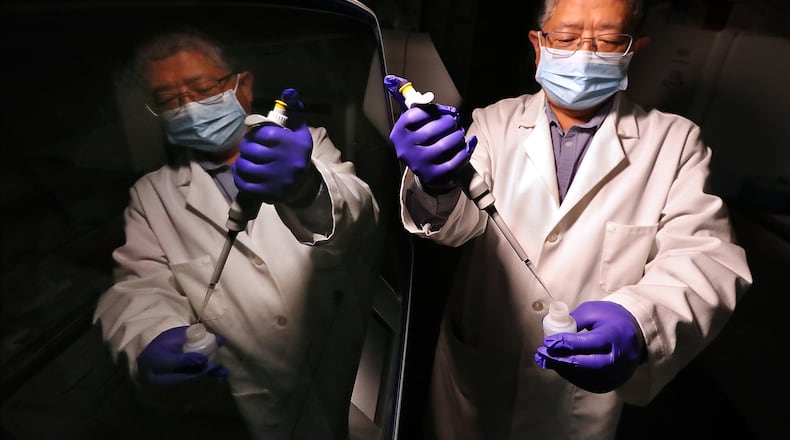Machines whir away as scientists in the lab at the Center for Biotechnology and Genomic Medicine of the Medical College of Georgia at Augusta University try to unlock the code of disease that can pose a threat to human life.
Jin-Xiong She, the lab’s director, is making sure genetic material from patients is properly sequenced to identify the mutation to blame for their illnesses. He has used the genetic sequencing platforms to answer lingering questions about juvenile diabetes and other ailments.
Now, he and his staff of scientists stand ready to help in solving one of the greatest scientific puzzles of their time: To identify which mutations of COVID-19 are a threat to millions of Georgians.
But, like some other genetic researchers, they are at a standstill. They say they cannot aid in the public health emergency without some direction from authorities.
“We have the capabilities to help, but we have not been asked to do so,” he told the Atlanta Journal-Constitution.
Experts point to the lack of coordination as yet another example in an endless string of stumbles by U.S. authorities to try to halt the spread of the virus. The latest misstep: A failure to act rapidly to identify mutations of the virus, which can only be performed through genetic sequencing of samples.
“This is the same story over and over,” said Brian Castrucci, an epidemiologist who had worked for the Georgia Department of Public Health and now heads a public health charity in Maryland. “It happened with testing, and the rollout of the vaccine and now the variants. We were wholly unprepared for the threat we knew was coming.”
Credit: Curtis Compton / Curtis.Compton@
Credit: Curtis Compton / Curtis.Compton@
By massive sequencing, public health authorities would be able to understand where outbreaks across the U.S. are most likely to occur, as well as develop better strategies for containing variants. Yet, there has been no concerted effort to identify and round up the labs that have the expertise or platforms, like She’s, to do the sequencing.
“This has been a problem with COVID since it started,’' said Marlene Sautter, director of laboratory services at Premier Inc., a North Carolina-based provider of medical equipment to healthcare systems. “There has never been a (state or federal) registry of who is doing what.”
Only a month ago, federal authorities announced the first large-scale longitudinal genomic survey of the virus since the pandemic took over last spring. As part of the effort, the U.S. Centers for Disease and Prevention Control awarded contracts to several commercial laboratories to provide genomic sequencing of samples of SARS-CoV-2, the virus that causes COVID-19. The survey will be made up of a large set of random samples collected from across the U.S.
Credit: Curtis Compton / Curtis.Compton@
Credit: Curtis Compton / Curtis.Compton@
Experts say the survey will provide a baseline of information for state and national surveillance, define changes in transmission and improve the public health response to the virus. Many now worry, however, that it may already be too late to stop infections of the variant.
Georgia is among states that already have seen several dozen cases of the variant that has caused rampant infections in the United Kingdom. State officials have identified 45 so far, most in the greater Atlanta metro area.
“This is the same story over and over. It happened with testing, and the rollout of the vaccine and now the variants. We were wholly unprepared for the threat we knew was coming."
State health officials say, though, that it’s likely that the variant has already spread to many more people. Even at a time when new infections are plummeting and a vaccination campaign is underway, no one knows how fast the variant may be spreading and where. That’s because only a tiny fraction of coronavirus samples are being sequenced.
In Georgia, where more than 780,000 cases of COVID-19 have been confirmed, only 552 cases have undergone genetic sequencing required to detect variants, according to information from an international science initiative.
“We are at the tip of the iceberg, but we don’t know how big the iceberg is underwater,” said Kaiser Permanente of Georgia epidemiologist Dr. Felipe Lobelo, a former CDC officer.
Credit: Curtis Compton / Curtis.Compton@
Credit: Curtis Compton / Curtis.Compton@
Playing catch up
Public health experts have been sounding the alarm for months about the need for a national surveillance system and coordinated effort to track variants. They say the problem is not a lack of technology or expertise. It’s an absence of leadership and a lack of resources for overburdened labs trying to juggle diagnostic testing with the search for genetic changes.
“Smart people at the CDC have known since last March we needed to do genetic sequencing,” Lobelo said, “and part of it was, with the previous administration, every state was on their own in their response and there was a lack of coordination which made everything more difficult.”
The Biden administration has called the current state of sequencing unacceptable and says its proposed spending plan includes funding for scaling up surveillance for variants, but it is unclear how much money will be spent on these efforts, and on what programs.
Several major obstacles lie in the way of getting a quick handle on the problem. It takes about one week to decode a genome in order to tell whether it has experienced a mutation, though thousands of samples can be done “in parallel,” said She, of the Augusta lab.
That raises the questions of how many labs can perform such massive specimen testing and whether they have the expertise needed. Once labs with the capacity are identified, they would need to be provided with the supplies and other resources, such as additional staff.
“Smart people at the CDC have known since last March we needed to do genetic sequencing and part of it was, with the previous administration, every state was on their own in their response and there was a lack of coordination which made everything more difficult."
And there’s the issue of making sure there is someone to collect and sort the data in a manner that can be shared widely, as well as an entity like a state agency that can disperse it, experts say.
“It’s not going to be good if labs are doing this and nobody is collating the data,’' Sautter said. “They need to collaborate and have a central repository for the data and make sure everyone who is doing sequencing testing is reporting it. That, to me, would be the best way, so that we could get our hands around who is doing it and can identify and let everybody know where the problem is.”
The CDC is working now to make up for lost ground.
In early January, the U.S. was averaging only about 3,000 genome sequences a week, a CDC official told the AJC. According to an analysis of data provided by GISAID, an international science initiative, the U.S. has sequenced only 90,742 samples out of 27 million cases. That lags three dozen other countries.
Since then, CDC has been scaling up and has contracted with private labs to conduct more sequencing. The agency has a goal of hitting full capacity this month, analyzing 6,000 samples per week, which include samples from state health departments.
The CDC also set a goal for all states to scale up to get to the point where 5% of all positive coronavirus tests are sequenced.
Georgia has recently taken steps to increase sequencing and expects more federal funding to help with those efforts, DPH spokeswoman Nancy Nydam said in an email.
The Georgia Public Health Lab started doing genomic sequencing about a month ago. Now, it is doing 50 a week, and the CDC is sequencing another 50 Georgia samples.
Meanwhile, commercial labs in Georgia are doing about 100 per week, work being done through contracts with the CDC. And university labs, including Emory University, are also doing genomic sequencing on coronavirus samples, and more of it now.
“At this point, even states like California and Texas are only doing about 2-3% of their tests, so there is a long way to go for all of us,” Nydam wrote.
It’s a race against the variants. The rapid spread of the coronavirus around the globe has given the coronavirus opportunity after opportunity to mutate. The British variant has 17 mutations, including several that impact the way the virus binds to human cells and infects them. Variants first detected in South Africa and Brazil have now been found in some parts of the U.S.
“The U.S has no excuse here,” said Gigi Gronvall, a senior scholar at the Center for Health Security at Johns Hopkins School of Public Health. “We have all the ingredients to be able to do this, and it should be and it is being vastly expanded.”
Faster results
Some public health officials in Georgia have said it can take weeks between the time a test is found to be positive and undergoes genetic sequencing, and word gets back to their departments about variants.
That is why one goal is to get results faster.
Nydam said positive tests are randomly selected and forwarded for sequencing, which takes about a week. Because the sequencing process is complex, Nydam said she wasn’t sure it could be speeded up.
Dr. Anne Piantadosi, an assistant professor in the department of pathology and laboratory medicine at Emory University, has been doing sequencing since the earliest days of the pandemic and says the multi-step process takes about five days.
First, genetic material is extracted from the sample, which is usually a nose swab. Then, sequencing machines map out the entire SARS-CoV-2 virus genetic code — all 29,903 individual building blocks. The machine can take a couple of days to complete that, and then scientists must manually review the findings.
Piantadosi said the process could be speeded up with robotic instruments to help with some tasks and by researchers working around the clock.
A faster turnaround may be essential in the race against the variants, say public health authorities in the U.K. Some want to see no more than 36 hours between initial testing and getting results, so authorities can isolate the cases and do contact tracing.
Nydam said contact tracing can start the moment a person has a positive test, and wouldn’t need to wait for results on whether the strain was a variant. Sequencing is for surveillance purposes, she said, and doesn’t change the course of treatment or prevention efforts.
But knowing whether or not a COVID-19 case is a specific variant could make a huge difference, experts say. For example, a new study suggests that a promising monoclonal treatment, which must be given to patients early after infection, is failing against some variants of the virus, such as those that have emerged in South Africa and Brazil.
“It is how we use genetic information to guide the best medical action,” said She, the molecular geneticist in Augusta.
Castrucci, the former Georgia DPH official now with the de Beaumont Foundation in Maryland, said the U.S. hasn’t been tested in decades like it is now.
“America is at a crossroads, and we have to decide whether we want to get serious and preventing the spread of this virus, and so far we have not shown we have the appetite to do so,” he said. “We need to make some hard decisions on what we are going to spend our money on. The enemy is clear, and it’s not conventional armies. It’s viruses.”
AJC data specialist Jennifer Peebles contributed to this article.
The Latest
Featured







